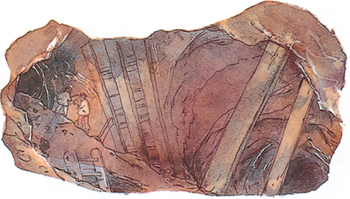

It was dark and dirty down in the mine, in the maze of tunnels, and the holes in the floors that dropped to darker passages further down, and there was lots of climbing on tippy trembling ladders up and down, and that with baskets of heavy ore on your back. The hammering and blasting made your ears ring, and the dust ringed round the bal-mens’ lips and eyes and nostrils, and made them look strangely.
Thomas didn’t know what he should call things. He didn’t know that a bucket of tin was called a kibbleful, and the shafts were called winzes, and the time they spent down the mine was a core, and his lunch break was croust time. People kept shouting at him and telling him things. Thomas hated it.

Just once he asked a question of his own. When all the nearby banging and hammering stopped for a moment, there was a tiny faint ringing and pattering noise, as though he could hear another team of workers faintly through the thick of the rock, or as though a battering of raindrops was ringing on a tin roof a little distance off.
“What’s that?” asked Thomas, and Jack the tribute man told him it was the fairy miners — the Buccas — who must be working a tiny seam somewhere nearby.
“What do they look like?” asked Thomas.
“We don’t see them; and it’s only one day in twenty we hear them, either,” said Jack. He was smiling and Thomas thought perhaps it was a leg-pull.
“Back to work now,” said Jack. It seemed to go on for ever, and Thomas couldn’t believe when croust time came that it was only half-way through the day.
The men all sat on benches in one of the tunnels right where they were working, and Jack the tribute man passed the water barrel round from hand to hand, and each man unwrapped his pasty, and began to eat.
Thomas sat on the very end of the croust bench, next to the darkness, and furthest from the candles. He was so miserable that there was a channel washed clean by tears on both his dirty cheeks. He got out his own little pasty, and did it smell good!

And he had no sooner unwrapped the golden crust, and opened his mouth for the first bit, than he heard a faint little voice from somewhere beside his shoes, saying “Not so fast! Not so hasty! Give us a bite of that there pasty! We be mortal hungry! We be a-dying down here!”
Thomas looked down, and blow me! He saw standing there, not knee high to him, a little fellow dressed top to toe as a bal-man, with a tiny hammer in his hand, and a tiny borer tucked through his belt, and a tiny candle in his hatcap, and he was looking at Thomas’s pasty with such ravenous longing on his wrinkled old face that Thomas couldn’t help but feel sorry for him.
So Thomas held out the pasty for the little fellow to have the first bite, and snap! The little fellow in one bite took nearly all the pasty there was, except for the thick curve of crust with Thomas’s dirty fingerprints on it. There was very little left on the crust for Thomas to nibble.

“Hey!” cried Thomas.
“I suppose you’re wanting a wish,” said the little fellow. “Fair enough. What will it be?”
Thomas thought how tired he was. “I wish it was time to go home!” he said.
“Sleep it out, then,” said the little fellow.
The men finished eating and drinking, and picked up their tools, and there was Thomas fast asleep on the end of the bench.
“Let him be till we need him,” said Jack the tribute man. “He’s new to the work.”
So Thomas slept through half the afternoon, and the rest of the day went more quickly than the morning, and then he could climb up the towering ladders and gain the open air, and the good green grass.
“How was the pasty?” asked Birdy, as the troop of tinners came down to the ferry that evening.
“It was good, but there wasn’t enough,” said Thomas.
“I’ll make you a man-sized one tomorrow,” Birdy promised him.
